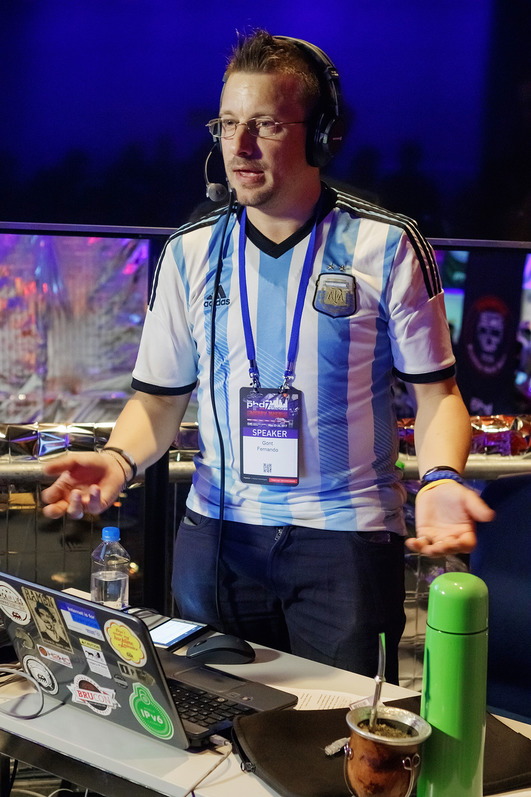Fernando Gaunt will talk about IPv6 security on PHDays 8
Only a few days left until the end of Call for Papers. The program committee has already selected the first group of speakers who have fallen into the main technical program, and in early March we introduced you to one of the key speakers of the forum, Ilfak Gilfanov . If you want to speak at one podium with renowned security experts, you have one last chance - you can apply before March 31 . In the meantime, you are preparing, we will submit another key technical report of the forum.

An expert and security consultant at SI6 Networks Fernando Gont will be speaking at PHDays 8. He specializes in data security research protocols and collaborates with private and public organizations around the world. He worked on protocol security projects for the British National Infrastructure Security Coordination Center (NISCC) and the UK National Infrastructure Protection Center (CPNI). As part of his work, he wrote recommendations for network engineers and developers of the TCP / IP protocol suite, and also the first to conduct a full-fledged analysis of the security of the IPv6 protocol.
At PHDays, Gaunt will give a talk on "How we walked to secure IPv6."
')
The whole world is moving to a new version of the Internet Protocol - IPv6, which was developed with consideration of the future development of the Internet. It is already supported by content providers such as Google and Facebook, and several major Internet service providers, and many organizations have planned its deployment over the next few years.
IPv6 should solve the problems of Internet addresses that IPv4 has encountered by using an address length of 128 bits. Despite the fact that the function of IPv6 is the same as that of IPv4 (moving packets over a network), there are serious differences between the two protocols and the features of the interaction between them, which can lead to serious security problems.
Recently, security experts have reported a sharp increase in the number of network attacks that exploit known IPv6 vulnerabilities. In early March, the first DDoS attack from IPv6 nodes was registered. The sources of the DNS dictionary attack were about 1,900 native IPv6 nodes belonging to more than 650 different networks. The victim of the attack was the network of DNS-services Neustar.
By the way, it was Gont who helped develop RFC 8021, a patch designed to prevent fragmentation attacks on routers operating under the IPv6 protocol in large-scale networks.
As part of the report on PHDays 8, Fernando Gaunt will talk in detail about the IPv6 protocol device and how its current level of security has been achieved. The speaker will talk about the main decisions taken to standardize the protocol and their impact on security and privacy. He will analyze IPv6 vulnerabilities that an attacker can use for his own purposes. It will also demonstrate publicly available tools that exploit these vulnerabilities.
Register and come to Positive Hack Days to listen to the live performance!

An expert and security consultant at SI6 Networks Fernando Gont will be speaking at PHDays 8. He specializes in data security research protocols and collaborates with private and public organizations around the world. He worked on protocol security projects for the British National Infrastructure Security Coordination Center (NISCC) and the UK National Infrastructure Protection Center (CPNI). As part of his work, he wrote recommendations for network engineers and developers of the TCP / IP protocol suite, and also the first to conduct a full-fledged analysis of the security of the IPv6 protocol.
At PHDays, Gaunt will give a talk on "How we walked to secure IPv6."
')
The whole world is moving to a new version of the Internet Protocol - IPv6, which was developed with consideration of the future development of the Internet. It is already supported by content providers such as Google and Facebook, and several major Internet service providers, and many organizations have planned its deployment over the next few years.
IPv6 should solve the problems of Internet addresses that IPv4 has encountered by using an address length of 128 bits. Despite the fact that the function of IPv6 is the same as that of IPv4 (moving packets over a network), there are serious differences between the two protocols and the features of the interaction between them, which can lead to serious security problems.
Recently, security experts have reported a sharp increase in the number of network attacks that exploit known IPv6 vulnerabilities. In early March, the first DDoS attack from IPv6 nodes was registered. The sources of the DNS dictionary attack were about 1,900 native IPv6 nodes belonging to more than 650 different networks. The victim of the attack was the network of DNS-services Neustar.
By the way, it was Gont who helped develop RFC 8021, a patch designed to prevent fragmentation attacks on routers operating under the IPv6 protocol in large-scale networks.
As part of the report on PHDays 8, Fernando Gaunt will talk in detail about the IPv6 protocol device and how its current level of security has been achieved. The speaker will talk about the main decisions taken to standardize the protocol and their impact on security and privacy. He will analyze IPv6 vulnerabilities that an attacker can use for his own purposes. It will also demonstrate publicly available tools that exploit these vulnerabilities.
Register and come to Positive Hack Days to listen to the live performance!
Source: https://habr.com/ru/post/352222/
All Articles